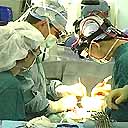
Heart attack patients will be given a groundbreaking new treatment involving an injection of their own stem cells to attempt to repair the damage their hearts have suffered, it was announced today.
Fifty cardiac patients at two London hospitals will have the stem cells extracted from their bone marrow and injected into their hearts, when they are brought in suffering from an acute heart attack. Consent for the procedure will be sought from patients after an angioplasty procedure has been completed.
The doctors involved in the clinical trials believe the treatment should delay or prevent the onset of heart failure. It is hoped that the stem cells, which have the ability to develop into a range of cells, will repair the damage to the heart muscle.
Professor John Martin, of University College London, said there was a common misconception that heart attack patients were unconscious when admitted to hospital, when in fact most were "completely compus mentis" and quite capable of making rational decisions after an angioplasty.
The cardiac specialist added that only those patients with one blocked artery would be eligible for inclusion in the clinical trial. He said: "We will choose patients that have a clot in one artery feeding to the front of the heart. We won't consent patients with two or three blocked arteries."
The professor said that a patient's stems cells could be extracted and processed in just two hours, allowing the possibility to administer the treatment in time to prevent damage to the heart.
He said: "Animal studies suggest there is an early window in which you can prevent the damage. We aim to administer the [stem cell] treatment within five hours from when the patient is admitted."
The research project, the first to be supported by the UK Stem Cell foundation, is aimed at delaying or preventing the onset of heart failure, which can lead to a serious deterioration in quality of life and, sometimes, death.
But the British trials, at the London Chest hospital and the Heart hospital, will be the first to test whether the treatment works within the critical five hour window.
Around 300,000 people in the UK have a heart attack each year and nearly half die, according to NHS Direct. Half of those who die do so from cardiac arrest - when the heart stops completely - within three or four hours of the start of the attack.
Dr Anthony Mathur, consultant cardiologist at the London Chest hospital, part of Bart's and the London NHS trust, said: "If we can demonstrate improvement in the quality of life of patients, then this will be a significant step forward in the treatment of heart disease.
"Because the stem cells are taken from the patient themselves, there are minimal ethical issues surrounding this procedure. There is also less likelihood of rejection complications."
Mr Martin added: "Previous studies in the heart have shown that stem cell delivery to the heart is safe. We will show whether it works in acute heart attack."
David Macauley, the chief executive of the UK Stem Cell Foundation, said: "This is the first known project of its type in the UK to combine stem cell delivery to the heart with primary angioplasty - where the blocked arteries in heart attack patients are opened as quickly as possible. It addresses one of the biggest killers in the UK."
The patients in the trail given the stems cells will be compared with another 50 given a "dummy" injection. Upon admission to hospital they will first undergo an angioplasty to open up blocked arteries. This involves inserting a thin, hollow, flexible tube, called a catheter, into a blood vessel in the groin or arm. A tiny balloon is then pushed through the catheter into the blocked coronary artery and inflated to restore the blood flow.

